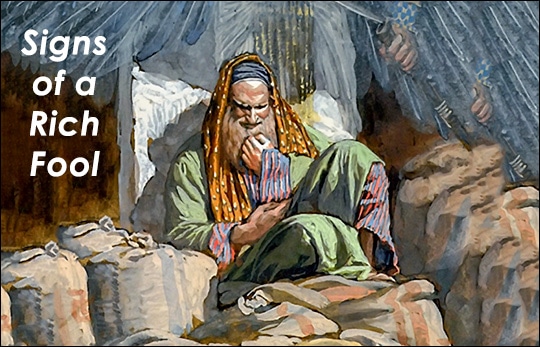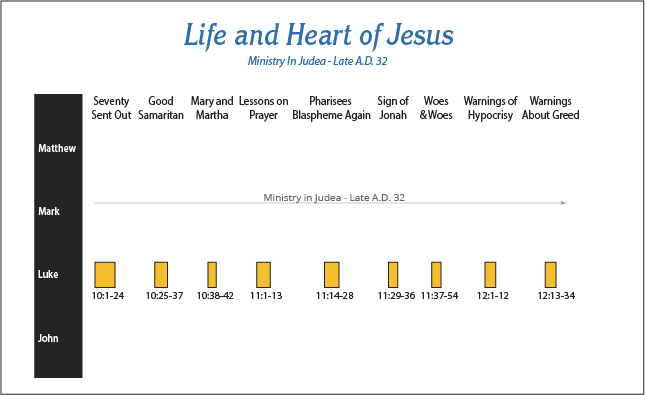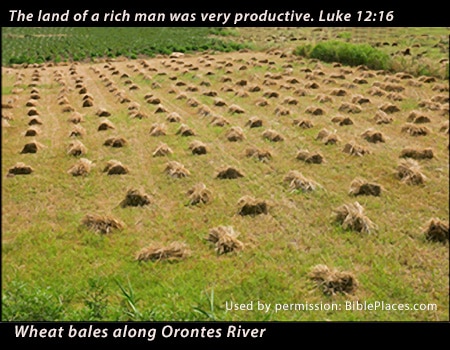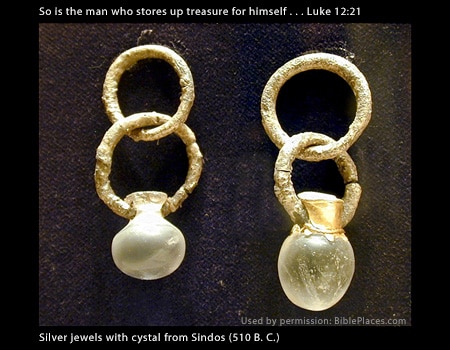
The sad truth about fools is that they think they are wise and not fools. They do not know that they are foolish and reject knowledge. Others know that a fool is a fool, but not the fool. That is the message of Proverbs 12:15, “The way of a fool is right in his own eyes, but a wise man is he who listens to counsel.” Proverbs 14:16 reveals that a fool does not avoid evil and is an arrogant and thoughtless individual. “A wise man is cautious and turns away from evil, but a fool is arrogant and careless.” Proverbs 18:2 says, “A fool does not delight in understanding, but only in revealing his own mind.” Proverbs 23:9 warns, “Do not speak in the hearing of a fool, for he will despise the wisdom of your words.” This study is about a rich fool. Yes, even a rich person can be a fool. We will discover that he knows how to make money, but he is foolish in spiritual things. He thinks he is wise but he is self-deceived. This study comes from Luke 12:13-21.
The Blindness of Greed
The opening verse of our study is Luke 12:13,
Someone in the crowd said to Him, “Teacher, tell my brother to divide the family inheritance with me.” Luke 12:13 (NASB)
We are told that someone in the crowd wants Jesus to tell his brother to distribute the family inheritance and give him something. William Barclay reports,
It was not uncommon for people in Palestine to take their unsettled disputes to respected Rabbis . . .[1]
The Greek for “teacher” is didaskalos. It is a term of great respect. From the divine perspective, Jesus was the Rabbi of rabbis. We are told that the person presented the problem to Jesus. The father had died and the brother has refused to share the inheritance with this person. In ancient Israel a parent’s inheritance was normally given to the oldest male child (Genesis 25:31-34). If the husband had two wives, then the oldest son received two-thirds of the family inheritance and the youngest received what was left. A daughter received an inheritance only if the father had no sons (Numbers 27:1-9). If a man had no children, then his inheritance was given to his brothers (Numbers 27:10-11). The Levites did not have an inheritance to pass on to their children since everything they had belonged to the Lord (Numbers 18:20-24 ; Deuteronomy 10:9 ; Deuteronomy 18:2 ; Joshua 13:33).
In this real-life situation, verse 14 reveals that this person is a man, a male. That is, this person was a brother who brought his complaint to Jesus. Yet, it is clear that the request was inappropriate given the Old Testament laws about inheritances. Since the person asking Jesus the question was a brother, he most likely was not the oldest son in the family yet he wanted a portion of the inheritance. This brother wanted Jesus to tell his brother “to divide the family inheritance with me.” He wanted more than he had!
After my father and my mother died, all three sons in the family gathered at the attorney’s office and the attorney read the will. Our parents’ property was divided equally among the sons. If anyone wanted more, no one said anything. How tragic it would have been if one of the sons had protested and demanded more. Greed is awful. Whoever asked Jesus to do this wanted more possessions from this world. Maybe it was money, valuables, jewelry or a painting.
Years ago I conducted a memorial service for a dear elderly couple. The husband died first and his wife died about six months later. They left two children. I am glad that the dead wife did not know that her daughter reportedly had spent a large amount of her mother’s bank account buying things for her house. She did not split the money with her brother fifty-fifty. Greed!

Jesus Refuses to Get Involved
Jesus’ reply to this individual was essentially a “No!” No, He would not interfere.
But He said to him, “Man, who appointed Me a judge or arbitrator over you?” Luke 12:14 (NASB)
Why did Jesus refrain from getting involved? There are most likely several reasons. First, the laws regarding inheritances had already been given and this individual just needed to follow what God had already commanded. In Proverbs 13:22 God states that a good man leaves an inheritance even to his grandchildren. An inheritance can include the house and wealth according to Proverbs 19:14. However, one never knows if the children and grandchildren will squander the money. That was Solomon’s concern in Ecclesiastics 2:18-21. In fact, research has demonstrated that most inheritances are spent within twelve months and ninety-five percent of inheritances have disappeared within two years. Imagine, you work hard to earn the wealth and then your children squander it on televisions and toys. Is that another reason for Jesus’ decision? Why should He waste His time dividing up the worldly possessions that will only be squandered? Another reason as to why Jesus may not have gotten involved is that the individual was obviously greedy. Why help a person obtain something that they are not entitled to according to the law so that they can appease their own greed?
The mostly likely reason Jesus decided to not get involved was that He did not come to give us worldly possessions but to help us in spiritual matters. In fact, preoccupation with the world’s wealth wars against our spiritual walk with God. Jesus came to help us spiritually and not financially, contrary to the teaching of some!
Beware Of Every Form of Greed
Then Jesus spoke to the crowd. Notice the word “them.” He warns them against greed.
Then He said to them, “Beware, and be on your guard against every form of greed; for not even when one has an abundance does his life consist of his possessions.” Luke 12:15 (NASB)
Jesus starts with the word, “Beware!” The Greek word for beware is horao. It is related to the Greek word blepo which means to see, but horao is a command with the sense of breadth of discernment. That is, be on guard against every form of greed. The English translation is too elaborate. Instead of “every form of greed” a literal translation of the Greek is “all greed.” The Greek word for “greed” is pleonexia. A fuller explanation of the word is a “greedy desire to have more, covetousness.”[2] That is, Jesus says beware of “all desire to have more.” What “more” do you want? Do you want more love? Do you want a better house? Do you want more fame? Are you a pastor who wants more people to attend your church? Or, maybe you want the folks to give more to the church? Maybe you work for a business and want that new promotion. Jesus says, “Look out for all desire to have more.”
Then Jesus gives us the reason for His statement. Even if you have everything you can desire, that is not your real life. Now one might think that life is one’s home, clothes, food or that bank account or financial investment. It is easy to think that life is one’s fame. How many times have we heard someone remind us that they have earned a PhD degree or he or she owns a business or is a CEO. Such comments reveal that they are consumed with the things of this world. Jesus says your life is not the sum of your reputation and everything that you possess.
It is reported that John Wesley had a different attitude about money and the possessions of this world.
John Wesley’s rule of life was to save all he could and give all he could. When he was at Oxford he had an income of £30 a year. He lived on £28 and gave £2 away. When his income increased to £60, £90 and £120 a year, he still lived on £30 and gave the balance away.[3]
It is sad when a person is consumed with greed.
The Romans had a proverb which said that money was like sea water, the more you drink the thirstier you become.[4]
God Blesses the Wealthy
What did Jesus mean by the thought that life does not consist of one’s possessions? He explained it in a parable about a rich man who acquired as many possessions as he could.
And He told them a parable, saying, “The land of a rich man was very productive.” Luke 12:16 (NASB)
Jesus begins the parable by describing a rich man. He does not describe the man by his nationality, gender or skin color, which is so common today. Jesus is not consumed with the external appearance of people, He is concerned about the heart. Watch what He does.
Instead of describing his physical appearance, Jesus describes his financial worth. Now some people find this offensive. I knew a woman who criticized those who were millionaires. She frequently made negative comments about those who had more than she had. But Jesus is not trying to divide people. He is not anti-rich and for the poor. Jesus is going to use this parable to help us see that we are just like the rich man – consumed with worldly possessions. Using the rich man in the parable makes the illustration stronger, but we have the same problem. Even the poor and middle-class want more! We are not any different.
In the parable Jesus tells us that the rich man has a very productive land. Acts 14:16-17 tells us God blesses the non-believer and believer. It is a witness that God exists and is loving. That is why the wealthy non-believer is wealthy and does well.
In the generations gone by He permitted all the nations to go their own ways; and yet He did not leave Himself without witness, in that He did good and gave you rains from heaven and fruitful seasons, satisfying your hearts with food and gladness. Acts 14:16-17 (NASB)
Wealth is not necessarily a sign that you are blessed of God, as some teach. Wealth screams that God is our provider and helper! God made the rich man’s land productive and he noticed.

Subtle Influence of Prosperity
Next we are told that the rich man began thinking about the prosperity of his fields and asked a logical question. What is he going to do with all of this prosperity?
And he began reasoning to himself, saying, “What shall I do, since I have no place to store my crops?” Then he said, “This is what I will do: I will tear down my barns and build larger ones, and there I will store all my grain and my goods.” Luke 12:17-18 (NASB)
The Greek word for “reasoning” is dialogizomai. The Greek verb is in the imperfect tense and has the idea of a repeated and prolonged decision making process. He had an internal discussion and maybe he included others in the process. He considered options and the benefits of those options. He debated about what he should do. Most of us would do the same.
He makes a logical decision. His fields are producing more than his barns can store. Therefore, what must he do in order to store all of this extra grain? What a wonderful problem to deal with, most of us would think. His logical decision is to tear down his current barns and build larger ones for all that God has given him. God did it. The rich man did not control the rain or weather or insects. He might have used an irrigation system and battled the bugs, but ultimately God was in control. Most of us would be rejoicing. What a blessing!
Hedonist Approach To Wealth
Verse 19 gives us insight into the attitudes of many people.
And I will say to my soul, “Soul, you have many goods laid up for many years to come; take your ease, eat, drink and be merry.” Luke 12:19 (NASB)
Notice the man’s words, “. . . laid up for many years to come . . .” He had more than he needed. He had a large nest egg of wealth. This wealthy man decided to retire and rest, eat and drink and enjoy life. That is the goal of perhaps most people. They are looking forward to retirement so that they can stop working and have fun. Statistics have shown those who retire and recline in the easy chair will eat and drink their way to an early death – often within 12 months after retirement. This rich man did not realize that he would die soon too! I wonder if he did a lot of golfing, traveling, eating, drinking and partying? If he did not give himself to indulgence, then he should have because his life here on planet earth was his heaven. Hell was his future life. That is what Jesus said in the next message.
But God said to him, “You fool! This very night your soul is required of you; and now who will own what you have prepared?” Luke 12:20 (NASB)
Jesus says that the man was a fool. This is not an insulting comment but a descriptive comment. Jesus described the type of person he was. He lacked understanding and wisdom. He wanted the things of this world – ease, comfort, food, drink and fun! Oscar Wilde believed that money was the key to everything also and he proved it when he said,
When I was young, I used to think that money was the most important thing in life, now that I am older I know it is!
He was like the rich fool. He thought money was everything.
We are so easily deceived. We chase happiness and we think wealth will provide it. Someone has written,
Happiness is like a butterfly. The more you chase it, the more it will elude you.[5]
Earlier in Jesus’ ministry, He said in the Sermon on the Mount,
Blessed are those who hunger and thirst for righteousness, for they shall be satisfied. Matthew 5:6 (NASB)
Jesus gives us the secret to happiness. It is chasing after righteousness or holiness. Anyone who seeks to be forgiven of their sins will be declared to be holy, even though we are not. Then God will urge us to seek to be holy and not sin. That means that only a Christian who is seriously seeking to be holy can be happy (John 14:27; 15:11).
The rich fool did not realize that God would judge him after he died. Jesus said now his soul would be required. The Greek word for “required” is apaiteo. The basic meaning of the word is “to ask back, to demand back.” That is, upon death God judges each person and determines if the spirit goes to heaven or if He must throw the spirit into hell (Hebrews 9:27).
Finally, Jesus makes the obvious statement “. . . who will own what you have prepared?” Who will inherit your wealth? We cannot take it with us. Over the years I have conducted memorial services for people who have died and I have witnessed that none of them took anything with them. All of their possessions were still here when they were lowered into the ground or cremated. Who inherited their wealth?

Only Place We Have Investments
Now we should rejoice that Jesus continued His explanation because we can be confident that someone would have tried to use His parable to teach that one must be poor in order to enter heaven. Watch what Jesus does.
So is the man who stores up treasure for himself, and is not rich toward God. Luke 12:21 (NASB)
There is only one way to have wealth that lasts forever. Jesus tells us to store up our treasure in heaven. That wealth lasts forever.
Do not store up for yourselves treasures on earth, where moth and rust destroy, and where thieves break in and steal. But store up for yourselves treasures in heaven, where neither moth nor rust destroys, and where thieves do not break in or steal; for where your treasure is, there your heart will be also. Matthew 6:19-21 (NASB)
How do we store up treasure in heaven? The answer is store up rewards in heaven! In the Sermon on the Mount, Jesus gives us some examples as to how we can store up rewards in heaven. In Matthew 5:11-12 we are told that we can obtain rewards in heaven if we suffer for Christ. We can obtain rewards if we do not seek recognition and honor in our spiritual life such as when we give to others, pray and fast (Matthew 6:4). Matthew 10:41 states that there is a prophet’s reward for prophets. In Mark 9:41 Jesus says there is a reward for giving someone water. There are rewards if we love our enemies, do good and lend to others without expecting anything in return (Luke 6:35). Those who teach the Word of God and witness for Christ will receive a reward if their attitude is correct (1 Corinthians 3:8; 9:16-17).
Jesus is not encouraging us to be poor and give all of our money away. That spiritual truth is clear in the following passage. Notice that 1 Timothy 6:17-19 reveals that some Christians are wealthy. They can store up treasure in heaven in a number of ways – good works and sharing.
Instruct those who are rich in this present world not to be conceited or to fix their hope on the uncertainty of riches, but on God, who richly supplies us with all things to enjoy. Instruct them to do good, to be rich in good works, to be generous and ready to share, storing up for themselves the treasure of a good foundation for the future, so that they may take hold of that which is life indeed. 1 Timothy 6:17-19 (NASB)
Conclusion
The goal of every Christian should be to please God and not ourselves (Ephesians 5:10) since the ultimate reward is heaven. Now is it clear why Jesus was not interested in determining if the man’s brother shared the inheritance? The man was greedy for money. He had the wrong focus. He should have asked, “How can I have treasure in heaven?” What is your heart’s desire?
References
1. William Barclay. The Gospel of Luke. The New Daily Study Bible. Westminster John Knox Press. 201. p. 194.
2. Joseph Henry Thayer, A Greek-English Lexicon of the New Testament, Christian Copyrights. 1981, 516.
3. Ibid., page 195.
4. Ibid.
5. Bits & Pieces. Cited by Roy Zuck. The Speaker’s Quote Book. Kregel. 1997. p. 186.
Suggested Links:
How to Avoid WorryThe Signs of a Rich Fool
Christ is Savior and Judge